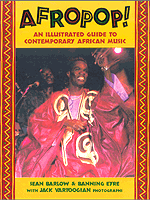nyairo2004
|
Nyairo, Joyce Alice Wambũi: |
 CONTENTS
CONTENTS
Declaration
Abstract
Dedication
Acknowledgements
Abbreviations
Part 1
Introduction xi
Chapter One
‘Poverty, piracy, poor facilities and government indifference’:
the political economy of the Kenyan Music industry 1
1.1 The Production of culture 2
1.1.1 The example of ‘Unbwogable’ 4
1.2 Then and now: A profile of Kenya’s music industry 10
1.2.1 Of media hype and the millennium boom 14
1.3 Piracy 20
1.3.1 Polic(y)ing the industry 26
1.4 The markets 30
1.5 Conclusion 36
Part 2
Chapter Two
The In(ter)vention of names 39
2.1 Author(is)ing authority 41
2.2 In Search of the authentic 52
2.3 Discourses from afar 60
2.3.1 The middle ground 68
2.4 The power of the nickname 69
2.5 ‘My signifier is more native [Kenyan] than yours’ 72
Chapter Three
Zilizopendwa: Between the romantic and the discordant –
cover versions, remix and sampling in the (re)membering of Kenya 79
3.1 Popular music as memory 81
3.2 Zilizopendwa as cover versions 86
3.2.1 Modernising the folksongs 90
3.3 Remix: Irony and disjuncture 98
3.4 Remix as continuity 105
3.5 Samples of the past 113
3.6 Conclusion 122
Chapter Four
(Re)Figuring the city: The mapping of places and people 125
4.1 Theorising space 126
4.2 Nairobi: ‘Green city in the sun’ 130
4.3 Walking in the margins vs. walking in the city 140
4.3.1 Of local Mona Lisas 144
4.3.2 Thugs and conmen 147
4.4 Conclusion 152
Chapter Five
Kenyan hip hop: Of global networks and the circulation
of local soundtracks 157
5.1 ‘Bridges of Sound’: More than global, less than local 159
5.2 ‘Uhiki’ and the Legacy of ‘Put up Your Hands and
You Scream’ 164
5.2.1 Matatus: Soundtracks and trendsetters 171
5.2.2 ‘Ting Badi Malo’ and the further domestication
of hip hop 176
5.3 ‘Ukilya Moko’: Gospel goes hip hop 183
5.4 Conclusion 189
Chapter Six
‘Ritwa Riaku’ and ‘Unbwogable’: National Longing and the antinomies of the postcolonial nation 193
6.1 Reading postcolonial politics 194
6.2 Corruption and ethnicity in Sawa Sawa 203
6.2.1 ‘Daima’: Between cycles of betrayal and hope 217
6.3 Transforming ethnic discourse into national desire 224
6.3.1 Rewriting national history 227
6.4 Conclusion 235
Conclusion 240
Works cited 254
Selected discography 270
Appendix
i) Interviews 272
ii) Web discourse 273
iii) Kalapapla (2003) album sleeve 277
iv) Web discourse 278
v) Map — Nairobi metropolitan area 280
vi) Adverts
a) Nissan Hardbody – Atoti 281
b) Flamingo Airlines – ‘But Do we Say’ 282
c) VCT – Eric Wainaina 283


 CONTENTS
CONTENTS CONTENTS
CONTENTS INHALT (Button Type)
INHALT (Button Type) CONTENTS
CONTENTS